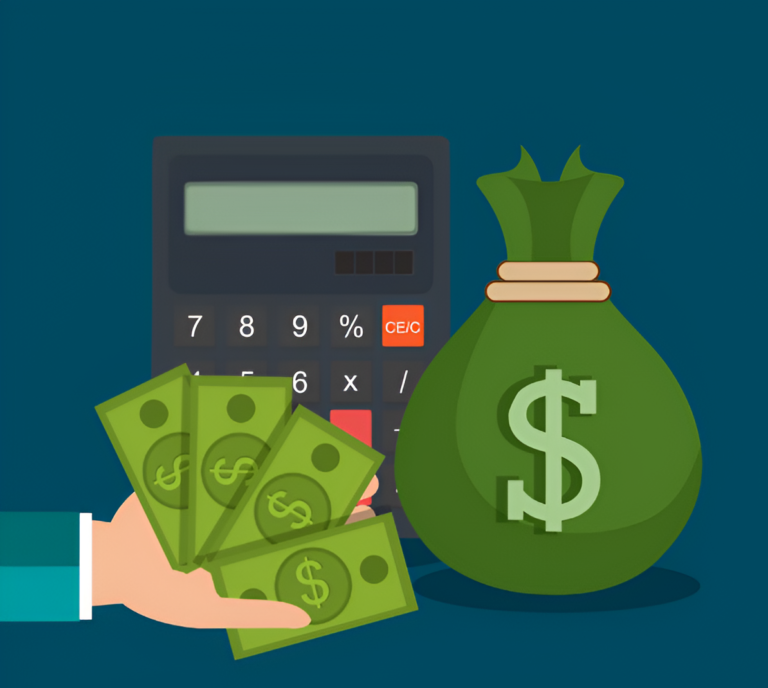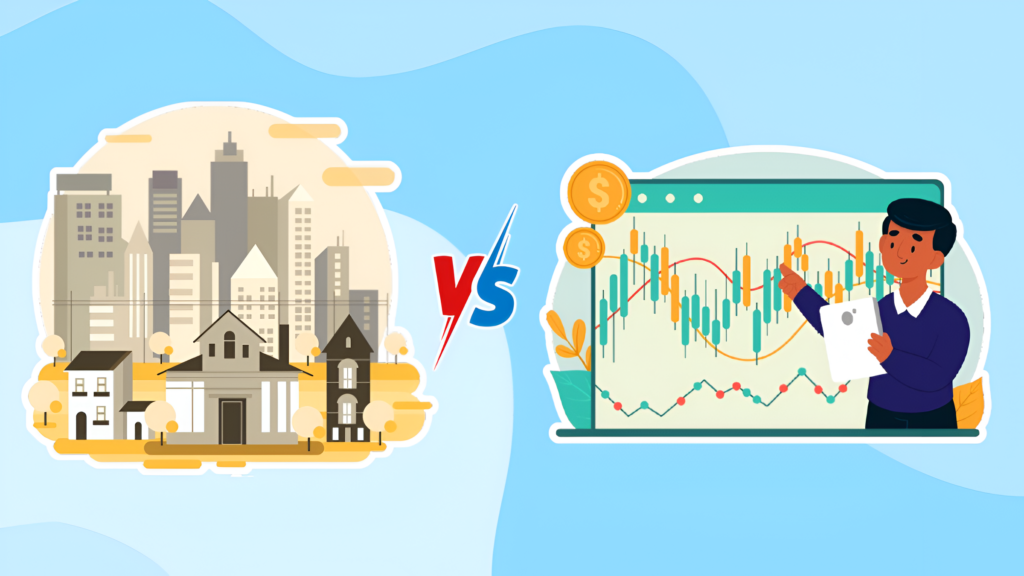Introduction
When it comes to investing your hard-earned money, two of the most famous choices are real estate and the stock market. Each offers unmistakable benefits and difficulties, settling on the choice of where to contribute an exceptionally private one, impacted by financial goals, risk resistance, and time responsibility.
Real estate has for some time been viewed as a dependable and unmistakable resource, offering consistent income, long-haul value appreciation, and the potential for tax cuts. Then again, the stock market offers the chance of fast development, high liquidity, and lower section boundaries; however, it accompanies its own arrangement of dangers like instability and market vacillations.
How Much Money Do I Need to Invest?
Putting resources into both real estate and the stock market can be worthwhile; however, each requires an alternate measure of cash to get everything rolling. The right speculation decision relies upon your monetary objectives, risk resistance, and how much capital you will commit. Let’s explore how much money you’ll need to invest in both markets.

Investing in Real Estate: The Capital Requirements
Real estate investment commonly requires a more significant starting capital speculation than the stock market. Here’s the reason:
1. Down Payments for Properties
The most significant barrier to entry is the down payment. Whether you’re purchasing a single-family home, a multi-unit property, or business land, most loan specialists will require an upfront installment going from 3% to 20% of the property’s price tag. For instance, if you need to buy a permanent spot for $300,000, you could require an initial investment somewhere in the range of $9,000 (3%) to $60,000 (20%).
- Primary Residences: The base initial investment for a primary residence can be pretty much as low as 3-5% through unique credit programs like FHA loans.
- Investment Properties: For an investment property or rental property, the necessary initial installment normally goes from 15-25%, contingent upon the loan specialist and your reliability.
2. Closing Costs
Notwithstanding the upfront installment, there are closing costs engaged with buying land, which by and large reach from 2% to 5% of the property’s price tag. These charges cover things like loan origination, title insurance, and property inspections.
For a $300,000 home, closing expenses could run somewhere in the range of $6,000 and $15,000.
3. Ongoing Expenses
Possessing land accompanies extra continuous expenses. Local charges, protection, support, and property management fees (if applicable) can add up quickly, particularly if the property isn’t creating sufficient rental pay to cover these costs. On top of this, there’s the chance of unexpected repairs.
4. Leverage in Real Estate
One benefit is the capacity to use leverage (borrowed money) to amplify your investment. With a 20% down payment, you control an asset worth five times your initial investment, which can prompt more prominent returns on the off chance that the property values in esteem.
Total Capital Needed for:
To get started, you generally need a down payment, closing costs, and potentially funds for repairs or improvements. In many cases, you may need anywhere from $20,000 to $100,000 or more, depending on the market and property type.
Investing in the Stock Market: The Capital Requirements
The stock market offers a much lower barrier to entry compared to real estate. You can begin putting small amounts of money in, making it a popular choice for new investors.
1. Low Minimum Investment Requirements
Unlike real estate, which normally requires a huge number of dollars, the financial exchange permits you to contribute with only two or three hundred bucks, or even less. Some brokerage accounts allow you to buy fractional shares, meaning you can put resources into costly stocks like Amazon, Google, or Tesla for just $1 to $10.
- Brokerage Accounts: Most conventional brokerage firms have no minimum deposit requirements; however, some might offer upgraded administrations (for example, access to more research or trading tools) if you deposit larger sums, typically starting from $500 to $2,000.
2. No Extra Charges or Progressing Costs
At the point when you purchase stocks, there are no extra costs like property support, expenses, or protection. The essential costs engaged with stock market investing are brokerage fees (if applicable) and potential taxes on gains.
While certain merchants charge an expense for each exchange, many presently offer a commission-free exchange. Furthermore, the securities exchange is highly liquid, meaning you can sell your shares quickly if you need access to cash.
3. Fractional Shares and ETFs
Fractional shares offer permits you to put more modest sums in costly stocks. You can also invest in exchange-traded funds (ETFs) or index funds, which permit you to enhance with a lower capital expense. ETFs commonly start at $50 to $500 for a differentiated arrangement of stocks, making it simple to spread your speculation across numerous areas and organizations with a somewhat limited quantity of capital.
Total Capital Needed:
You can begin with just $100 to $1,000, assuming you are purchasing individual stocks or putting resources into ETFs. In any case, the more you contribute, the more your profits can develop over the long haul because of compound interest.
Real Estate vs. Stock Market: Comparing Initial Investment Needs
| Factor | Real Estate | Stock Market |
|---|---|---|
| Initial Capital | $20,000 to $100,000+ | $100 to $1,000+ |
| Down Payment | 3% to 20% of property value | Not required |
| Additional Costs | Closing costs, taxes, insurance, maintenance | Brokerage fees, trading fees (if any) |
| Leverage | Can use borrowed money to increase returns | Not applicable |
| Liquidity | Low liquidity (takes time to sell) | High liquidity (sell in seconds) |
| Risk Level | Moderate to high, dependent on property value and market | Higher short-term volatility, but long-term growth potential |
Which is Better for Long-Term Investment?
When it comes to long-term investment, both are broadly viewed as strong decisions for building wealth. In any case, the two investment vehicles offer altogether different benefits and difficulties. Assuming that you’re hoping to develop your wealth steadily over time, it’s critical to comprehend how each can function for you in the long run.

Real Estate: Long-Term Wealth Building
It has favored long-term investment for centuries, with good reason. How about we investigate why it tends to be a superb decision for long-term wealth-building:
1. Appreciation Potential
Over time, real estate generally appreciates in value. Historically, home prices in the U.S. have expanded at a typical pace of around 3-5% each year. While there are fluctuations in the market, real estate will, in general, ascend in esteem long term, particularly in developing urban communities or desirable locations.
- Capital Gains: Assuming you purchase property in an area that is developing, gentrifying, or experiencing increased demand, your property’s estimation can rise altogether north of a very long while.
- Inflation Hedge: It is viewed as a good hedge against inflation since property estimations and leases normally increment as expansion rises. This means that after some time, your investment may outpace inflation.
2. Steady Cash Flow
Particularly rental properties give consistent income through rental pay. While this pay can vary in view of opening rates, rental interest, and upkeep costs, numerous investors can depend on it as a predictable wellspring of income.
- Leverage and Returns: One of the benefits is the capacity to use leverage (borrowed money). With a somewhat small upfront installment, you have some control over a property worth fundamentally more, which can duplicate your profits on the off chance that the property appreciates.
- Tax Benefits: Investors can also take advantage of tax deductions such as depreciation, mortgage interest, and property tax deductions, which can generally increase productivity.
3. Tangible Asset
Not at all like stocks, real estate is an actual resource, which can give a feeling that everything is good to long-term investors. You own a property that you can see, contact, and lease or create, providing tangible benefits beyond just financial returns.
4. Stability
It is generally less unpredictable. While the real estate encounters patterns of wins and fails, it’s, for the most part, more steady than stocks, particularly when you center around very much found properties or enhanced land portfolios.
Stock Market: Long-Term Wealth Accumulation
On the other hand, the stock market offers its own exceptional benefits for long-term investors. Let’s explore why stocks can be a magnificent vehicle for abundance gathering after some time:
1. Higher Long-Term Returns
Historically, it has given higher normal yearly returns. Over the long term, it has yielded a normal yearly return of around 7-10%, calculating in expansion. This outperforms land’s drawn-out typical return.
- Compounding Growth: One of the most remarkable benefits of this is compounding. By reinvesting dividends and returns, your investment can develop dramatically over the long run. The more you leave your cash on the market, the greater the compounding effect.
2. Liquidity
Stocks offer a lot higher liquidity. You can buy and sell stocks in seconds, making them ideal for investors who might require quick access to their capital or need to effectively change their portfolio.
- Diversification: Allows you to diversify your investments across different areas, businesses, and, surprisingly, global business sectors, which can reduce risk and increase your long-term returns.
- No Transaction Fees: Unlike real estate transactions, which include losing costs, realtor fees, and other expenses, trading stocks for the most part has negligible exchange expenses, especially with today’s commission-free brokers.
3. Lower Barrier to Entry
You don’t require significant capital to begin with. Many representatives permit you to begin with only two or three hundred bucks, and fractional shares mean you can invest in high-priced stocks like Amazon or Tesla without needing large sums of money.
- Variety of Investment Options: You can choose from individual stocks, index funds, ETFs, and mutual funds, giving you a lot of choices for fitting your portfolio to suit your risk tolerance and long-term objectives.
4. Minimal Maintenance
When you buy stocks, there’s tiny maintenance involved. Unlike real estate, which requires managing tenants, maintaining the property, or paying for repairs, stocks just require occasional checking and rebalancing of your portfolio, which should be possible whenever it might suit you.
Real Estate vs. Stock Market: Long-Term Comparison
Let’s break down the key factors that matter for long-term investors:
| Factor | Real Estate | Stock Market |
|---|---|---|
| Potential for Growth | 3-5% annual appreciation, but subject to market cycles | 7-10% average return annually over long periods |
| Cash Flow | Steady rental income (if managed well) | Dividends and capital gains (not guaranteed) |
| Risk | Moderate to high risk, affected by location and market conditions | Higher short-term volatility, but generally stable long-term |
| Liquidity | Low (can take months to sell) | High (can buy/sell anytime during market hours) |
| Barriers to Entry | High (large down payments and transaction costs) | Low (can start with as little as $100-$1,000) |
| Maintenance | Requires time and effort (maintenance, management) | Minimal, mostly monitoring and adjusting portfolio |
Which Offers Higher Returns?
| Factor | Stock Market | Real Estate |
|---|---|---|
| Historical Returns | 7-10% average annual returns | 3-5% average annual returns |
| Volatility | High, with frequent short-term fluctuations | Lower, more stable in the long term |
| Leverage | Limited leverage opportunities | Leverage available, amplifying returns |
| Income Generation | Dividends and capital gains | Steady rental income |
| Tax Benefits | Capital gains and dividend taxes | Depreciation, mortgage interest deductions, 1031 exchange |
| Liquidity | High liquidity, can buy/sell anytime | Low liquidity, takes time to sell |
Pros and Cons

| Factor | Real Estate | Stock Market |
|---|---|---|
| Initial Investment | High (down payment, closing costs) | Low (can start with a few hundred dollars) |
| Liquidity | Low (takes time to sell) | High (buy/sell in seconds) |
| Income Generation | Steady rental income | Dividends and capital gains |
| Risk | Moderate to high, affected by market cycles | High volatility, but higher long-term returns |
| Leverage | Possible (can borrow money) | Limited leverage |
| Management | High (property management, maintenance) | Minimal (monitoring portfolio) |
| Diversification | Limited (depends on the number of properties) | High (diversify across stocks, sectors, funds) |
| Tax Benefits | Depreciation, 1031 exchange | Capital gains tax, tax-advantaged accounts |
| Market Cycles | Slower cycles, but still subject to downturns | Rapid price fluctuations |
Comparison of Risks
| Risk Factor | Real Estate | Stock Market |
|---|---|---|
| Volatility | Moderate (property values tend to be more stable) | High (stock prices can fluctuate significantly) |
| Liquidity | Low (takes time to sell property) | High (can buy/sell stocks quickly) |
| Management Costs | High (maintenance, management fees, taxes) | Low (minimal management required) |
| Market Risk | Dependent on local and national economic factors | Affected by global and macroeconomic conditions |
| Interest Rate Risk | High (interest rate changes affect mortgage costs) | Moderate (affects borrowing and market sentiment) |
| Regulatory Risk | High (local zoning laws, rent controls, property taxes) | Moderate (government regulations on companies and markets) |
| Company-Specific Risk | Low (less exposure to individual company failures) | High (stock performance tied to company health) |
Conclusion: Real Estate vs. Stock Market Investment
Both real estate and the stock market offer critical open doors for development and abundance collection; however, they accompany particular arrangements of dangers, advantages, and difficulties. The most ideal decision between the two relies to a great extent upon your investment goals, risk tolerance, and time horizon.
FAQs
Can I lose money in real estate?
- Yes, just like any investment, real estate carries risks. Factors such as market downturns, interest rate hikes, poor property management, or changes in local zoning laws can lead to losses. If property values fall or you have trouble finding tenants, your investment could underperform.
Can I lose money in the stock market?
- Yes, the stock market is volatile, and stock prices can fluctuate dramatically, sometimes leading to significant losses, especially during market crashes or economic recessions. However, if you diversify and invest for the long term, you are more likely to recover and see positive returns over time.
Can I invest in both real estate and the stock market?
- Yes, it’s a wise strategy to invest in both asset classes. Diversifying between real estate and stocks can help balance risk and reward. For instance, real estate can provide steady cash flow and asset stability, while stocks offer growth potential and liquidity.

Owner of Paisewaise
I’m a friendly finance expert who helps people manage money wisely. I explain budgeting, earning, and investing in a clear, easy-to-understand way.


I admire your skill to turn ordinary topics into intriguing writing. Keep it up!
This blog motivates me to pursue my own passions, thanks.